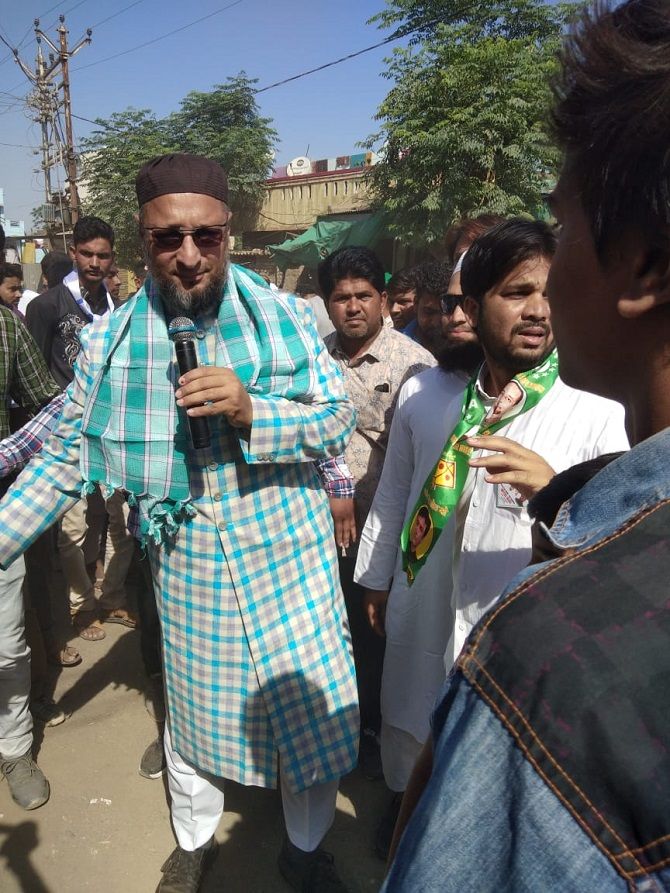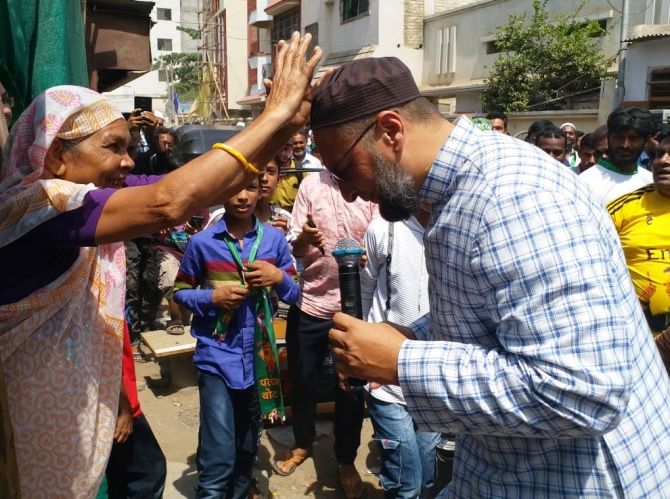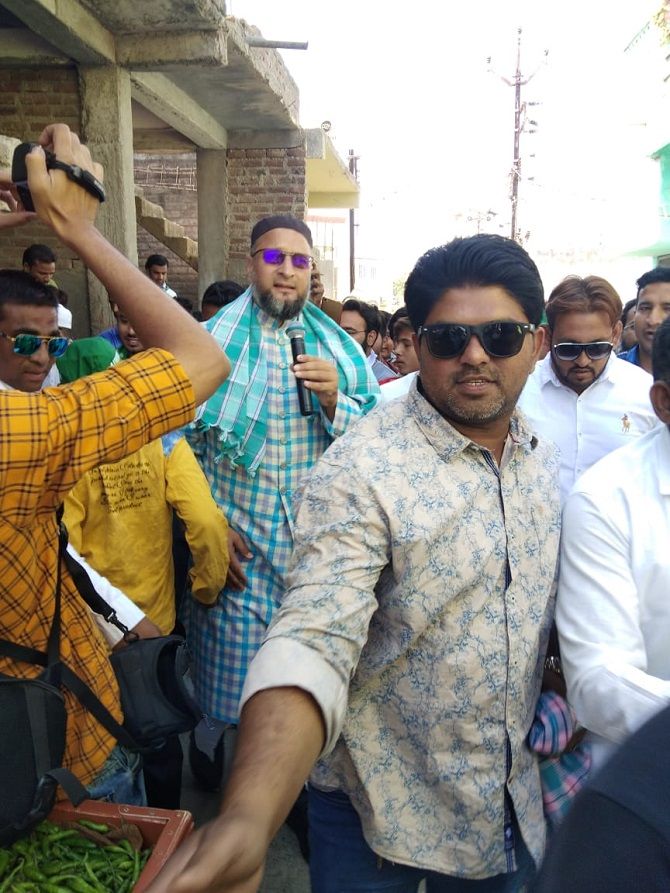 | « Back to article | Print this article |
'Had Muslims been a vote bank, they wouldn't be in the condition they are now,' Asaduddin Owaisi tells Jyoti Punwani.

The inevitable finally took place in Aurangabad.
Last month, when Imtiaz Jaleel, the sitting MLA from Aurangabad, was announced as the All India Majlis-e-Ittehadul Muslimeen's Lok Sabha candidate from the city, well known Aurangabad activist Subhash Lomte told Rediff.com, "The MIM's entry will result in instant polarisation."
On Saturday, April 20, the Shiv Sena newspaper Saamna's banner headline asked: 'Shivshahi pahije ki Razakari pahije?' ('You want Shivshahi or Razakari?')
The quote was from Shiv Sena President Uddhav Thackeray's speech at the Sena-Bharatiya Janata Party rally held on Friday night in the city.
Even as Thackeray was arousing yet-to-be-submerged memories of the violence perpetrated by the nizam's Razakars against Marathwada's Hindus in Hyderabad -- prior to the 1948 police action that resulted in Hyderabad becoming part of India -- at another rally across the city, AIMIM President Asaduddin Owaisi was arousing emotions in his own inimitable way.
"I want to share two incidents of my parliamentary life with you," Owaisi told the audience, comprising both his young male followers, as well as the older followers, both male and female, of his ally, Vanchit Bahujan Aghadi chief Prakash Ambedkar.
"I don't normally talk about my own experiences," Owaisi said, modulating his declamatory tone, "But I am sharing these incidents with you because I consider you my own."
Having got his audience all wound up, he continued, "When the triple talaq bill was introduced, I thought surely someone would get up to oppose it. I looked here and there, hoping for help."
Here his voice choked up.
"I waited and waited," he continued. "Finally, when no one arose, I got up to speak, to say that the Bill went against the Constitution given to us by Babasaheb Ambedkar. It was left to me alone to oppose that Bill."
By the time he finished, the MIM boys at the back of the maidan could be heard shouting emotionally.
Normally, Owaisi might have gone on about the triple talaq bill and the threat to Muslim personal law. But this was not the place to do so. Here was a mixed audience, and the master demagogue knew how to play them.
"Ya Allah!." continued the Hyderabad MP, raising his voice dramatically, "I have not felt as much agony even when I laid my late father into his grave as I felt when the Bill granting 10% reservation on economic grounds was introduced and again, nobody opposed it."
"There were 100 SC MPs present in the House," recounted Owaisi, "but not one of them had the courage to open their mouth. Then, I got up. I took Babasaheb's name and said the Bill was against what the architect of the Constitution had wanted."
As cheers and applause, this time from the entire gathering, rent the air, Owaisi delivered the final thrust.
"Had my elder brother Balasaheb (as Prakash Ambedkar is called) been there, this would not have happened. Those 100 MPs sitting silently would have been no match for one Balasaheb, Ambedkar's own blood. When he goes to Parliament, then even the walls of Parliament will have to hear his defence of the Constitution."

Owaisi's speech at the final rally of the colourful Aurangabad campaign being conducted by the AIMIM and Ambedkar's supporters illustrated every characteristic of this unusual tie-up.
Emotional appeals to Muslim identity, and presenting himself as a messiah working selflessly to deliver his community from those who have oppressed it for the last 70 years -- the Congress, and now the BJP -- have been the hallmark of Owaisi's speeches in Maharashtra ever since 2014.
It was in the months preceding the October 2014 assembly polls that his Hyderabad-based party made its entry in Maharashtra as a contender.
But the man who has now allied with Dalit leader Prakash Ambedkar sings a different tune when he is with him. Instead of invoking Allah at every step, he invokes the Constitution. Not just the Constitution, but "Babasaheb Ambedkar's Constitution."
This masterly strategy kills two birds with one stone.
It immediately wins over the MIM chief's new voters, those Dalits for whom the Constitution is scripture, and Dr Ambedkar is God. It simultaneously highlights the fact that their current leader is a direct descendant of their God.
"Many people have their reservations about Prakash Ambedkar," a veteran Dalit Congressman tells Rediff.com, "but no one will express them openly because of his surname."
Indeed, many Dalits have said that this election is the time for them to repay their debt to their original icon, Dr B R Ambedkar.
"You have no problem voting for Imtiaz Jaleel?" In response to my question, a Dalit woman enthusiastically following Asaduddin Owaisi's padyatra through Aurangabad's Muslim areas replies: "He is Balasaheb's candidate. Balasaheb has told us: Even if I put a stone in front of you, you have to vote for it, because it is my candidate."
Jaleel himself said more or less the same thing at Friday's rally. "It is Balasaheb's adesh (edict): 'In every candidate, see my face.' Owaisi sahib too says: 'See my face in every candidate of MIM. Don't look at his caste or religion'."
"Is this going to be Prakash Ambedkar's brand of politics now?" asks a Dalit lawyer. "Is he going to be another Owaisi and run his party based on the authority generated by his surname?"
There has been one remarkable fallout though, of Asaduddin Owaisi's constant invoking of the Constitution. This basic document now means something to his young Muslim followers, even though they may never read it.
Until now, they saw the world exclusively through a Muslim-victimhood lens. Owaisi was their supreme leader because he -- and he alone, they insisted -- spoke of the injustices inflicted on them.
Today, they respect him even more as an expert -- again, in their opinion, the only MP who is an expert -- on the Constitution.
To his credit, the three-time MP and party supremo has shown a surprising readiness to learn from his new electorate too. At a meeting with Dalit intellectuals in Aurangabad, he was asked why a Constitutional expert like him kept saying 'Hindustan', though the official term in the Constitution was either 'India' or 'Bharat'.
"I speak in Urdu and that is the term used in Urdu," said Owaisi. "But I will try now to use the term Bharat."

Just a few hours later, at the public meeting, one heard for the first time, the term "Hindustan-Bharat" from Owaisi.
The extent to which his alliance with Ambedkar has made Owaisi modify his political persona, came through during a free-flowing conversation during his Aurangabad campaign.
The man who presented himself unabashedly as a leader of his community, now shies away from that description. "I don't want to be put in a box," he says.
The man whose main theme was Muslim victimhood, now says that discrimination has been practised against other marginalised communities too.
But on the necessity of political representation of Muslims through a Muslim party, Owaisi's stand remained unchanged.
"The crass reality is that unless you have an independent voice of your own, your issues won't be addressed," he says.
He cites the example of the only Muslim Congress MP from Bihar, Maulana Asrarul Haque Qasmi, an Islamic scholar on the executive committee of Dar ul Uloom Deoband, who stayed silent when the triple talaq bill was introduced because his party had forbidden him from speaking.
Since 2014, in speech after speech, Owaisi has beseeched Muslims to unite and vote for the AIMIM as their own party who would look after their interests, unlike the other parties who have only used them.
His aim has been to create a pan-Indian Muslim vote bank, with him as their only leader.
Even while protesting at the phrase 'pan-Indian' "I am already being called a new Jinnah," rues Owaisi. "Had Muslims been a vote bank, they wouldn't be in the condition they are now. It is Hindus who have always been the most powerful vote bank."
In Aurangabad, at an exclusively Muslim rally, Owaisi referred to the month of Ramzan and the religious significance of the date on which the city goes to the polls for Muslims. Indeed, even at the last rally of their joint campaign, where he shared the dais with Ambedkar, Owaisi referred to the next day being Shab e Baraat, one of the holiest days in the Islamic calendar.
At the end of his speech, he invoked Allah's duas (blessings). Describing himself as a "sinner", he asked Allah to shower his blessings on the weak.
What did the Dalits gathered there make of all this? Probably they viewed his religious fervour with the same indulgence that they viewed his refusal to enter a Buddh Vihar during his padyatra. "It is against the electoral code of conduct to enter places of worship while campaigning. Owaisi is, after all, a Constitutional expert," says one speaker at the meeting. Another Dalit defends Owaisi, saying idol worship was not part of Islam.
Beyond the lofty concepts of "defending the Constitution" and "giving voice to the marginalised", the AIMIM-Vanchit Bahujan Aghadi tie-up is very much also an alliance between two strong scions, each of whom keeps a tight grip on his unquestioning flock.
The flock may have genuinely begun to fraternise, but what sustains them is a constant heightened sense of religious and caste identity.
As good a recipe for polarisation as any. Surely a godsend for the BJP?